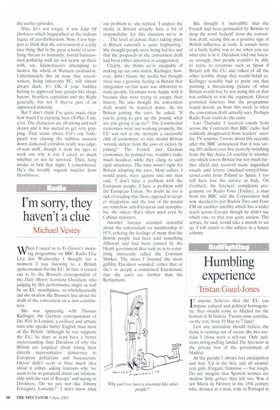I'm sorry, they haven't a clue
Michael Vestey
When I tuned in to Fi Glover's morning programme on BBC Radio Five Live last Wednesday I thought for a moment I was listening to a British spokeswoman for the EU. In fact, it turned out to be the Brussels correspondent of the Daily Mirror, Lorraine Davidson. who judging by this performance might as well be an EU mouthpiece, so wholeheartedly did she swallow the Brussels line about the draft of the convention on a new constitution.
She was appearing with Thomas Kielinger, the German correspondent of Die Welt in London, a civilised and urbane man who speaks better English than most of the British. Although he too supports the EU, he does at least have a better understanding than Davidson of why the British are sceptical about losing their directly representative democracy to European politicians and bureaucrats. Glover didn't seem to have much idea about it either, asking listeners why 'we seem to be so paranoid about our relationship with the rest of Europe' and saying to Davidson, 'Do we just not like Johnny Foreigner, Lorraine?' I don't know what our problem is,' she replied. 'I suspect the media in Britain actually have a lot of responsibility for this situation we're in . .. The level of debate that's taking place in Britain currently is quite frightening.' She thought people were being fed lies and that the proposals in the convention draft had been either distorted or exaggerated.
Clearly, she thinks we're incapable of making up our own minds. Kielinger, however, didn't blame the media but thought there was a genuine feeling in Britain that integration on this scale was abhorrent to many people. Germans were happy with it because they were trying to escape their history. He also thought the convention draft would be watered down. As for Britain joining the euro, he asked, 'If you're going to give up the pound, what are you giving it up for?' The Continental economies were not working properly, the EU was not at the moment a successful club of economies, so why should Britain 'wrestle defeat from the jaws of victory by joining?' The French and German economies, he pointed out, wouldn't make much headway while they clung to such rigid structures. The time wasn't right for Britain adopting the euro. Most callers, I would guess, were against and one man said, 'I don't have a problem with the European people, I have a problem with the European Union,' No doubt he too is sick of reading that those opposed to deeper integration and the loss of the pound are somehow anti-European and xenophobic, the smear that's often used even by Cabinet ministers.
Another listener sounded resentful about the referendum on membership in 1975, echoing the feelings of many that the British people had been sold something different and had been conned by the Heath government that took us in to something innocently called the Common Market. The more I listened the more gullible Davidson sounded; either that or she's so deeply a committed Eurofanatic that she can't see further than the Berlaymont. She thought it 'incredible' that the French had been persuaded by Britain to drop the word 'federal' from the convention draft, seeing this as a positive sign of British influence at work, It sounds more of a fairly feeble sop to me when you see what else is in it. Davidson told one listener, wrongly, that people wouldn't be able to retire to countries such as Spain if Britain left the EU and talked of all the other terrible things that would befall us. Kielinger sensibly had to point out that painting a threatening picture of what Britain would lose by not doing this or that was unlikely to win the argument. Glover promised listeners that the programme would devote an hour this week to what the convention draft actually says, Perhaps Radio Four could do the same.
Last Thursday I received emails from across the Continent that BBC radio had suddenly disappeared from readers' satellite TV systems. I wrote about this recently after the BBC announced that it was saving 05 million over five years by switching from the Sky Astra 2A satellite to another one which covers Britain but not much further afield and received many anguished emails and letters (michael.vestey@btinternet.com) from Poland to Spain. I too will have lost the service in Italy. On Feedback, the listeners' complaints programme on Radio Four (Friday), a man from the BBC said the Corporation had now decided to put Radios Two and Four FM on another satellite which has a wider reach across Europe though he didn't say which one, so that was quite useless. The service, he said, would take a month to set up. I will return to this subject in a future column.










































































 Previous page
Previous page